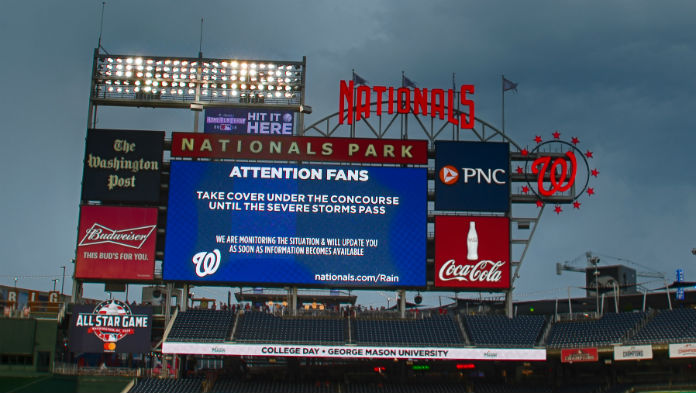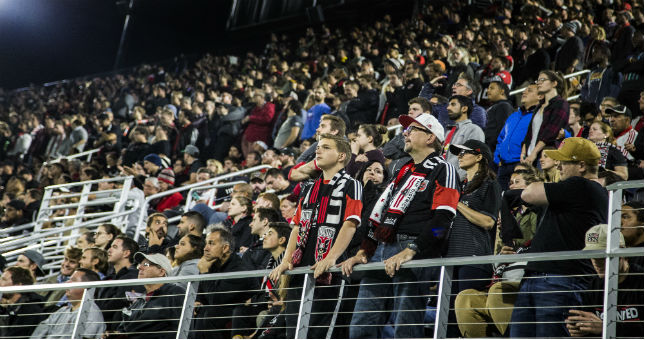DC Sports Betting Still Threatened By Egregious Proposal

Must be 21+ to participate (18+ in KY). Gambling problem? Call 1-800-GAMBLER (CO, IL, IA, KY, KS, LA, MD, MO, NC, NJ, OH, PA, TN, VA). Call 1-800-NEXT-STEP (AZ). Call 1-800-9-WITH-IT (IN). CALL 1-877-770-STOP (LA). Must be present in LA (select parishes). Licensee partner Amelia Belle Casino. Minimum $10 deposit required. Minimum odds -500 or greater. Bonus Bets wager excluded from returns. New customers only. T&Cs, time limits and exclusions apply.
A proposal from the Washington D.C. City Council to amend its sports betting bill has drawn outrage from gaming stakeholders as well as legacy media companies like the Washington Post.
That anger is more than justified.
The Council had sought to circumvent a competitive bidding process and instead grant the coveted sports betting operator licenses to Intralot, the partner operator of the D.C. Lottery. The public outcry has helped force D.C. lawmakers to walk back the proposal, at least for now.
But a threat to the fairness of D.C. sports betting – not to mention the District’s own financial bottom line – still remains.
At a meeting Tuesday, Council Chair Phil Mendelson pulled an emergency proposal for the sports betting bill that would bypass any request for proposals from other operators and instead grant Intralot the contract to run sports betting exclusivity – and without a chance for any other company to provide a bid.
With the D.C. Lottery already holding a de facto monopoly for city sports betting, this move just reinforced criticism that the council was already in the tank for the lottery and its partners.
Instead, now the committee on Committee on Finance and Revenue will hold a hearing on this issue at an upcoming meeting. There, committee members should realize the aesthetics and consequences of a no-bid contract for a company in Intralot that already has a disproportionate influence on the Council’s action – at the expense of other providers that may be able to give D.C. residents a better service at a lower cost.
Sadly, If earlier moves were any indication, the Lottery will still maintain favored status in the eyes on the council.
Lottery Remains Focus on D.C. Sports Betting

Though upsetting, the council’s move to unfairly benefit a Lottery partner shouldn’t have come as much of a surprise.
Overseen by the department of the City’s chief financial officer, the Lottery has always had a unique relationship with the government. Current CFO Jeffrey DeWitt made it clear he believed the Lottery presented the best provider and partner for D.C. sports betting.
That in part explains why Councilmember Jack Evans introduced a lottery-centric bill in September.
Touted as a “hybrid” system between the government-run entity and private purveyors, in reality it gave the vast majority of operating potential to the lottery, with only exceptions allowed for D.C. sporting venues or private businesses such as bars and restaurants.
In practice, only the major sporting venues, such as the homes of MLB's Washington Nationals, MLS' D.C. United as well as the NBA and NHL's Washington Wizards and Capitals, will have the resources to negotiate individual contracts.
Lottery Maintains Clear Advantage
Despite what Evans said behind the dais at previous meetings, a run-of-the-mill sports bar will not be able to finance the necessary licenses needed to offer a private sports betting service.
That means the Lottery will have exclusivity over almost the entire District. Without any traditional gaming centers in the District lines such as casinos or horse tracks, wagers will be taken through a Lottery-provided mobile app.
And that’s regardless if Intralot earns the operating partner contract or not. The legislation dictates the Lottery is all-but assured a monopoly no matter who its operating partner is.
This is also despite the fact that lotteries are rarely the best entities to provide sports betting in the first place.
Speaking to a group of lawmakers at a National Council of Legislators from Gaming States conference last week, lobbyist William Pascrell III restated opposition to a lottery model. Having helped launch the New Jersey market, Pascrell said lottery monopolies prevent states from reaching the full potential of their markets.
Instead, he encouraged competition, as in the case in New Jersey. With many of the top gaming providers and operators present in the market, New Jersey now takes in hundreds of millions in dollars of wagers monthly. Pascrell, and other gaming industry officials, widely acknowledge that the competitive factor between the business, which in turn allows better options and prices for consumers, has helped make New Jersey so successful.
This potential remains for other states that do the same, but increasingly seems unlikely in the District.
D.C. Makes Dubious Claims
It should come as no surprise that DeWitt ignored the consensus wisdom of much of the third-party and neutral-minded gaming industry and charged ahead with the lottery-centric model. To the Council, he said the Lottery would maximize profits over a competition-based infrastructure because it could give margins of nearly 20 percent.
For decades, Nevada, the sole legal sports betting provider in the nation, saw margins around five percent on wagers. To reach the lofty numbers espoused by DeWitt, the Lottery would only be able to give non-competitive lines or solely offer lopsided parlays.
Either way, this would keep D.C. players on the black market, where online offerings with offshore bookmakers are ubiquitous. Even should the Lottery reach its unrealistic expectations, there would be so few players placing legal wagers with government-sanctioned providers it would be all-but impossible to reach the multi-million dollar projections in annual net revenues for District coffers.
The bill does include a clause to open up the market to other providers if it’s in the best financial interest of the District. But if the Lottery was providing unrealistic numbers ahead of time, what’s to stop it from doing the same when their revenue expectations don’t add up?
The unfathomable financial projections have been accompanied by more head-scratching figures about the impact of a traditional request for proposal process.
Timeline Projections Draw Questions
D.C. officials said the RFP process could delay sports betting by up to three years. That timelines hasn’t come close to fruition for any of the eight states taking legal wagers.
Most states have gone from passage of their respective sports betting bill to taking bets in around six months. Pennsylvania, which was a worst-case scenario for implementation as it was derailed by exorbitant tax rates and preempted for months by the federal ban, still only took 13 months from when the bill was signed to when a casino took a wager.
This overblown fearmongering in the timeline was also another justification from D.C. officials to skip the RFP process. Citing neighboring Maryland and Virginia, officials said the launch of their markets would take away D.C.’s own potential and it needed to launch as soon as possible.
While both D.C.’s neighbors do in fact present a revenue threat to the District, the city is still far ahead of both states in the sports betting expansion race.
Virginia will take up a sports betting bill for the first time ever this month, but, if other states are any indicator, it will still likely take the better part of a year to take a bet – especially in a state that has been so long opposed to gambling.
Meanwhile Maryland took up a bill last year, but it couldn’t pass the state Senate. Even if a new incarnation of the bill passed this year, it will still take a public referendum on the 2020 ballot in order to come into law.
Despite the irrationally ominous projections, it was actually the latest push to strengthen the lottery’s stranglehold on the market that caused the delay.
Potential Already Snuffed
Had the D.C. Council gone about a more routine (and fair) means of seeking operators, it may have reached its initial goals to take a bet by February. Instead, stunts like this have in part prevented the bill from coming into law.
Though it was overwhelmingly passed by the Council in December, the bill has still not been signed into law by Mayor Muriel Bowser. Likely seeing the potential backlash for having signed a bill with such an unfair capitulation to Intralot, Bowser will almost assuredly wait until after the currently unscheduled finance committee meeting to so do.
While it awaits in a legislative limbo, the District continues to hurt itself to appease the Lottery.
The de facto monopoly was already a way to bolster the lottery at the expense of tax revenues as a whole. Now this new procedural process to circumvent anyone else from even attempting to operate sports betting, at best, delays implementation of a market that could have possibly launched next month.
At worst, it threatens the potential for all parties by giving an unjust award at the expense of the people of the city and its own revenue generating capabilities.
About the Author

Ryan Butler has spent more than 10 years covering sports, governments and the intersection between the two.

 Caesars Sportsbook Promo Code: $250 First bet match up to $250 bonus bets for Seahawks-Patriots on Friday
Caesars Sportsbook Promo Code: $250 First bet match up to $250 bonus bets for Seahawks-Patriots on Friday  ESPN Bet is Now theScore Bet Promo Code! Claim $1,000 Bonus for the Big Game, NBA
ESPN Bet is Now theScore Bet Promo Code! Claim $1,000 Bonus for the Big Game, NBA  Best 100% Deposit Bonus Casino Offers 2026: 100 Casino Bonus UK
Best 100% Deposit Bonus Casino Offers 2026: 100 Casino Bonus UK  2026 Super Bowl Betting Tracker: Today's Odds, Line Movements & Big Bets On Patriots-Seahawks
2026 Super Bowl Betting Tracker: Today's Odds, Line Movements & Big Bets On Patriots-Seahawks  Claim $1,500 for 2026 Super Bowl with BetMGM Bonus Code BOOKIES (Feb. 6)
Claim $1,500 for 2026 Super Bowl with BetMGM Bonus Code BOOKIES (Feb. 6)  FanDuel Promo Code: Gives $200 Bonuses for Seattle vs New England (Feb. 6)
FanDuel Promo Code: Gives $200 Bonuses for Seattle vs New England (Feb. 6)
Comments